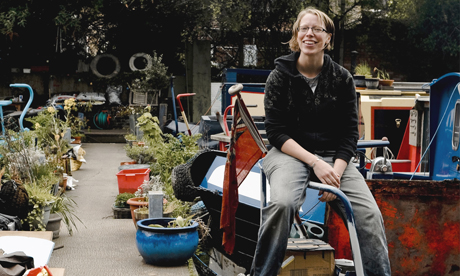Away from the Hackney main stream

Kingsland Basin resident Hannah Engelkamp Photo: © Bruno Conrad
Tucked behind Kingsland Road and encased in a rickety black fence lies Kingsland Basin, home to Hackney’s secret narrowboat community. From the bridge overlooking the basin from the Regent’s Canal, a series of neatly moored narrowboats bob like toy ships. The brightly coloured vessels are surrounded by pots of budding vegetable plants, compost bins and paint pots: a tidy yet shambolic home to the basin’s residents.
I am greeted by Hannah Engelkamp, a freelance journalist and relative newcomer to the canal lifestyle, who has lived in the basin for two years. The problem with the boat dwelling, she says, is that there is a chronic shortage of moorings. As most are short stay, the majority of narrowboat dwellers ‘tow path’ – travelling from mooring to mooring. Kingsland Basin is different. It is a permanent community, with electricity, water, recycling and even a floating garden, donated last year by the Shoreditch Trust.
According to British Waterways, Kingsland Basin is the only independently owned and run residential mooring in the UK. The Canals in Hackney Users Group – appropriately abbreviated to CHUG – are the collective leaseholders of Kingsland Basin and as a local charity, they work to preserve and promote the canal for the benefit of surrounding communities.
This unique collective ownership structure gives a tremendous sense of homeliness. “Everyone who lives here likes to live in a community and wants to have a hands-on relationship with their own environment,” says Engelkamp. The Hackney lifestyle, she says, is the perfect environment for boat dwelling. “The DIY feel in Hackney is so conducive to canal life. Everyone just rubs along together and it’s okay to do something a bit different.”
Many Kingsland Basin residents have nine-to-five jobs and live here as a welcome retreat from the daily grind of commuter life. Jerry Stephenson has been boat dwelling since 1982. Before settling in Kingsland Basin, he moved around the south of England, mooring near a railway station on a Monday morning to commute into the City, where he worked as an insurance broker. “I always wanted to live on a boat since I was a kid,” he says. “After the Second World War, the Normandy D-Day landing vessels were used as temporary housing for some of the families who fell victim to the Blitz. I had a friend who lived on one and I put it to the back of my mind as something I always wanted to do one day.”
Reese Jones, a freelance TV producer, had never been on a narrowboat before he gave up his flat for the canal life. “It takes a while to get used to the extra chores you have living on a boat. I never thought I’d be living in a house that rusts! Every time I’m out and get a call from one of the neighbours, I’m paranoid that they’re going to tell me the house has sunk!” But, he says, the simple things make it worthwhile. “I wake up to the sound of coots and moorhens, rain on the cabin roof.”
I am introduced to Jack Reay, who is clasping a set of freshly laundered towels. Reay is one of the three non-residents in Kingsland Basin. “I’ve lived in Hackney for 38 years,” he says proudly. “My father worked on the docks and I’ve messed around in boats since I was a toddler.” Reay has spent the last ten years restoring what was once an empty vessel into a traditional working narrowboat. His boat is pristine, with comfy sofas, expertly matched wallpaper and dollhouse-proportioned kitchen appliances. He shows me out the back, where a glossy green engine gleams in front of the traditionally restored back cabin. I ask when he plans on finishing his restoration project. “You’re never finished,” he sighs. “There’s always something more you can do.”
I am shown out by the other Basin residents, who regale me with stories about the biggest taboo – falling in the water. “Sometimes when we’ve had barbeques on the Basin you see someone teetering on the edge of the water with a drink – then splash!”, says Hannah Engelkamp. But the water is only a couple of feet deep. I turn back to thank Jack for showing me onto his boat. He has entered into an impassioned conversation with a neighbour. “I always come with good intentions of working on the boat, but do nothing,” he chuckles. “But there’s an old saying among boat dwellers: ‘narrowboating is the fastest way of slowing down’”.
